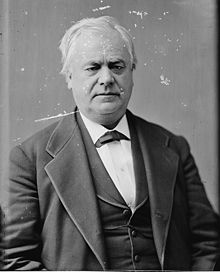Richard James Oglesby
| Richard James Oglesby | |
|---|---|

c. 1875
|
|
| 14th Governor of Illinois | |
|
In office January 16, 1865 – January 11, 1869 |
|
| Lieutenant | William Bross |
| Preceded by | Richard Yates |
| Succeeded by | John M. Palmer |
|
In office January 13, 1873 – January 23, 1873 |
|
| Lieutenant | John Lourie Beveridge |
| Preceded by | John M. Palmer |
| Succeeded by | John Lourie Beveridge |
|
In office January 30, 1885 – January 14, 1889 |
|
| Lieutenant | John Smith |
| Preceded by | John Marshall Hamilton |
| Succeeded by | Joseph W. Fifer |
|
United States Senator from Illinois |
|
|
In office March 4, 1873 – March 3, 1879 |
|
| Preceded by | Lyman Trumbull |
| Succeeded by | John A. Logan |
| Member of the Illinois Senate | |
|
In office 1860 |
|
| Personal details | |
| Born |
July 25, 1824 Oldham County, Kentucky |
| Died | April 24, 1899 (aged 74) Elkhart, Illinois |
| Political party | Republican |
| Alma mater | University of Louisville |
| Signature | |
| Military service | |
| Allegiance | United States |
| Service/branch |
United States Army Union Army |
| Years of service | 1846–1847 1861–1864 |
| Rank |
|
| Battles/wars | Mexican–American War, American Civil War |
Richard James Oglesby (July 25, 1824 – April 24, 1899) was an American soldier and Republican politician from Illinois. He served in the United States Army during the Mexican–American War of 1846–47, and after the war became a prospector during the California Gold Rush and was elected to the Illinois General Assembly. During the American Civil War, Oglesby volunteered for the Union Army and rose to the rank of major general, serving in the Western Theater; he left the army when he was elected Governor of Illinois in 1864, and would serve three non-consecutive terms in that office (from 1865 to 1869, for ten days in 1873, and from 1885 to 1889). He also served as a United States Senator from Illinois from 1873 to 1879.
The town of Oglesby, Illinois, is named in his honor.
Oglesby was born in Floydsburg, Oldham County, Kentucky. He was orphaned and moved to live with his uncle in Decatur, Illinois, in 1832, where he later worked as a farmhand, ropemaker, and carpenter.
With the outbreak of the Mexican-American War, he enlisted as a 1st Lieutenant in Company C, 4th Illinois Volunteer Infantry Regiment taking part in the battles of Veracruz and Cerro Gordo "where his regiment almost captured Mexican President General Santa Anna, but they had to settle for his cork leg, carriage and $20,000 in gold".
...
Wikipedia
